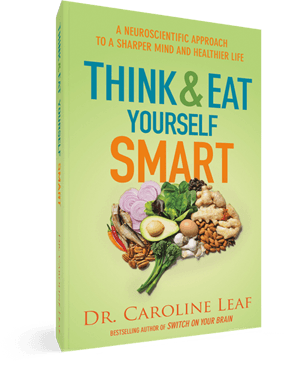Lately, I’ve been trying to choose healthier ways of feeding my family. I say “trying” because this is a struggle. Kids, as any parents know, are picky eaters. Cooking takes time. Healthy food is often expensive. There’s also a wealth of conflicting information about what we should and shouldn’t be eating. It can be hard to navigate all of this to make the best choices. That’s why I grabbed Think and Eat Yourself Smart by Dr. Caroline Leaf.
 I received a copy of Think and Eat Yourself Smart for review courtesy of the publisher; all opinions expressed are my own. This post contains affiliate links; as an Amazon Associate, I earn from qualifying purchases.
I received a copy of Think and Eat Yourself Smart for review courtesy of the publisher; all opinions expressed are my own. This post contains affiliate links; as an Amazon Associate, I earn from qualifying purchases.
I’m tired of all the fad diets that come and go. I’m tired to trying to sort through the hype about different types of foods. Think and Eat Yourself Smart: A Neuroscientific Approach to a Sharper Mind and Healthier Life talks about how our thoughts affect what we eat and how we can change our thinking to eat healthier. That appealed to the researcher in me and I began reading.
In Part 1, Dr. Caroline Leaf talks about the problems with today’s food industry. She paints a rather depressing picture of the Modern American Diet, or MAD, and talks about the problems with mass production, GMOs, and food politics. The MAD is contrasted to how our grandparents ate only a few generations ago. She also talks about our growing food crisis: “Today, we could feed the world’s starving people with a percentage of the food that is thrown away throughout the world.”
I’ve often thought back to how my family ate when I was growing up. We grew a huge vegetable garden every year, which fed our family for the winter. We also raised our own meat: chicken, turkeys, lambs. What we didn’t raise ourselves came from local farmers—we knew our dairy farmer, our bee keeper, and our wheat farmer (my mom ground her own wheat for baking). We picked raspberries and apples from our own trees and bought pears, peaches and cherries in bulk every fall for home canning. We knew exactly how all of our food got on the table and the work that went into doing that. Our diet was low in sugar and salt and we rarely ate processed foods. It was, in fact, a very traditional, non-MAD diet.
If there has been one consistent theme across the research I have done for this book, it is that our food systems are wired for love: when we care about the way our food is produced, and care about “what the animals we eat, eat,” we consume foods that are the most nourishing for us.
For most people, however, that sort of lifestyle isn’t possible. I can’t grow a garden, much less keep my own chickens. In the years since I’ve left home, I’ve found myself falling more and more into the MAD diet.
In Part 2, Dr. Leaf moves on from the big picture problems to how we think about the food we eat. She talks about how our thinking affects what we eat and what we eat affects our thinking. This section addresses specific things like sugar, gluten, television, emotions, sleep and more. Dr. Caroline Leaf lays out the hard facts about these, presenting solid research to show the impact that each of these topics has upon what we eat.
Two things I appreciated all the way through Think and Eat Yourself Smart were Dr. Leaf’s solid research and the Biblical grounding she gives to the topic. There are nearly 100 pages of notes at the back of the book, if you wish to follow-up on any of her research. She also quotes Scripture and ties our eating to a healthy spirituality, showing how even what we eat can glorify God—or not.
Part 3 pulls everything together into two chapters with concrete, practical steps we can take to start eating more healthy. The first chapter is all about our mindset. The second chapter is recipes. I’m so happy Dr. Leaf doesn’t just leave us with the facts in Think and Eat Yourself Smart, but also presents ways to apply these facts. The information in the book is a bit overwhelming, so having these steps to start a new thinking process is very helpful.
“My friend Dr. Caroline Leaf has the uncanny ability to explain complex topics in a way that is practical and attainable. Her insights in acquiring health, both physically and mentally, are beautifully penned in every page of Think and Eat Yourself Smart . I’m grateful for her hard-hitting advice. I’ve seen it transform the lives of many—including many people close to me. This book will change your thinking and your life.” ~ Priscilla Shirer
Dr. Caroline Leaf is a cognitive neuroscientist with a PhD in Communication Pathology specializing in Neuropsychology. Since the early 1980‘s she has studied and researched the Mind-Brain connection. During her years in clinical practice as a Communication Pathologist she developed tools and processes that help people develop and change their thinking and subsequent behavior. Her scientific Science of Thought techniques have transformed the lives of patients with Traumatic Brain Injury (TBI), learning disabilities, emotional traumas and released the potential of thousands of young students and adults.
To learn more about her or her books, drop by her website.

No Responses Yet